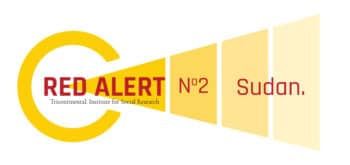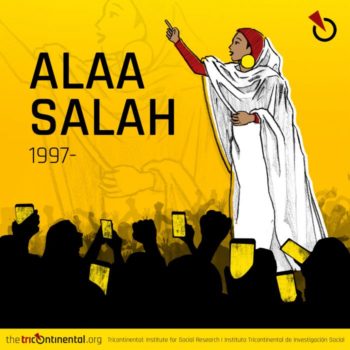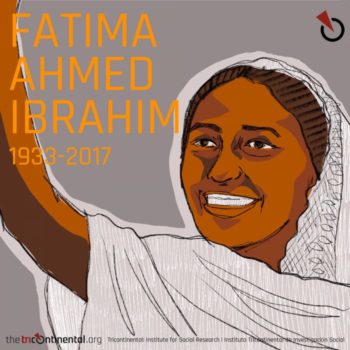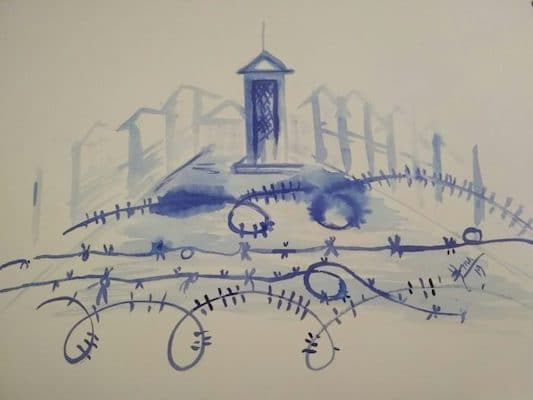Greetings from the desk of the Tricontinental: Institute for Social Research.
More than seven million Kashmiris remain suffocated by the Indian government. The curfew that went into effect on 5 August is still in place. The media is not able to get into the state and offer a report of the situation. Telephone and internet services have been shut down. Over two thousand academics, journalists, and politicians are in prison or under house arrest. Most recently, the Indian government arrested Farooq Abdullah (age 82) under the Public Safety Act of 1978 (which Amnesty International calls a ‘lawless law’). Abdullah’s father–Sheikh Abdullah–was the unchallenged leader of Kashmir’s liberation movement in the 1940s.
Despite the production of a state of fear, brave people have come out on the streets to protest the situation. A senior government official said that there have been at least 722 protests since 5 August. This is a testament to the steadfast determination of the Kashmiri people to prevent their elimination. But their protests and their words are not being amplified. It is as if Kashmir has vanished from the map.
Amongst the brave Kashmiris is Mohammed Yusuf Tarigami, the leader of the communist movement in the state. Tarigami, who comes from a small village in southern Kashmir, has spent the past fifty years fighting for Kashmir, dreaming of a Kashmir free of war and poverty. He won a seat in the Jammu and Kashmir Legislative Assembly four times (1996, 2002, 2008, and 2014), an assembly which the right-wing government in New Delhi suspended. Prisons are as familiar to him as the Assembly. There is ‘accumulated anger’ inside Kashmir, he says, anger that has no easy political outlet. To learn more about the situation in Kashmir, please read the Tricontinental: Institute for Social Research Red Alert #1.
 On 12 September, thousands of people took to the streets across Sudan to call for the ouster of the chief justice and the attorney general. The Sudanese Professionals Association–and the Sudanese Communist Party–have said that they are unhappy that the reins of power are with people like General Abdel Fattah al-Burhan and General Mohammed Hamdan Dagalo. They want to see a more civilian character to the government. To make sense of the situation in Sudan, Tricontinental: Institute for Social Research has released this week Red Alert #2. You can download it here, and read it below:
On 12 September, thousands of people took to the streets across Sudan to call for the ouster of the chief justice and the attorney general. The Sudanese Professionals Association–and the Sudanese Communist Party–have said that they are unhappy that the reins of power are with people like General Abdel Fattah al-Burhan and General Mohammed Hamdan Dagalo. They want to see a more civilian character to the government. To make sense of the situation in Sudan, Tricontinental: Institute for Social Research has released this week Red Alert #2. You can download it here, and read it below:
What Happened in Sudan?
On 19 December 2018, an uprising began in Sudan. This uprising would culminate in the removal of Sudan’s president–Omar al-Bashir–from power on 11 April 2019. The army staged a conservative military coup to abort the revolutionary tide and keep the same old policies. It dissolved the parliament and established a two-year military regime led by the Transitional Military Council. The revolutionary forces–galvanised into the Alliance of Freedom and Change, with the Sudanese Communist Party and the Sudanese Professionals Association at the front–continued their march forward, determined to make a full revolution. The clash between the Transitional Military Council and the Alliance of Freedom and Change continues. It could either result in an Egypt-like solution, where the military regime masquerades as a democratic party, or it could move forward with a revolutionary democracy.
Why Did the Sudanese People Rise?
In 2018, the range of negative social pressures rose as a result of the stagnation of Sudan’s economy. The growth rate fell to -2.3% that year. This was a result of at least four reasons:
- a. Wars. Omar al-Bashir had been in power since 1989. He oversaw two deadly wars in this period. The first war was between the north and south of the country, a war that in its second phase lasted from 1983 to 2005. This war resulted in the death of two million people, the displacement of four million people, and the partition of the country into Sudan and South Sudan in 2011. The second war was in the province of Darfur, which resulted in the death of millions and the destruction of that vast, marginalised region that has been deeply impacted by the desiccation of the Sahara Desert. Both conflicts weakened Sudan.
- b. Oil. Sudan’s economy is dependent on oil exports, with most of the oil in the southern part of the country. With the partition of Sudan, the country of Sudan lost 75% of its oil reserves to South Sudan. Nonetheless, in 2008, 21.5% of Sudan’s GDP came from oil exports (and drove a growth rate of 11.5%). When global oil prices collapsed in 2014, Sudan’s economy went into rapid decline.
- c. IMF. By 2017, Sudan had an external debt of over $50 billion–61% of its GDP–with about 84% of it in arrears. Sudan owed 89% of this debt to countries and to commercial banks (the rest to international financial institutions). In November 2017, the IMF recommended that Sudan’s government cut bread and fuel subsidies and devalue the Sudanese Pound. The government followed the IMF advice. Already, 50% of the Sudanese population lived in poverty. The situation went out of control after the subsidy cuts and the devaluation.
- d. Political Islam. Since 1976 Sudan has drifted into the worldview of political Islam. The US-backed dictator Jaafar al-Nimeiri allied himself with the Muslim Brotherhood that year. A mass uprising erupted in April 1985, resulting in the overthrow of the al-Nimeiri regime and opening the way for the restoration of a democratic process. Attempts were made between 1985-89 to reach a peaceful solution to the civil war in the South and to abolish the Sharia law that was introduced by al-Nimeiri and the Muslim Brotherhood alliance. However, the democratic process was short-lived. In June 1989 the Muslim Brotherhood staged a coup, toppled the democratically elected government, and dissolved parliament, political parties, trade unions, and all civil society organisations. It imposed the most reactionary regime resulting in the continuation of the war in the South, the dismissal of over 250,000 workers and civil servants from work, and the establishment of ‘ghost houses’ where leaders of the democratic forces were tortured (and some killed). Omar al-Bashir, who inherited this regime, continued the Muslim Brotherhood agenda. Rather than tackle the serious political, economic, and social problems in Sudan, the governments of al-Nimeiri and al-Bashir hid behind a harsh cultural agenda (which included blasphemy laws, laws against women’s rights, and policies against the diversity of Sudan’s peoples and culture). Both al-Nimeiri and al-Bashir fell because they had no answer to economic crises; their only response was repression against IMF riots.
 How Did the Sudanese People Rise?
How Did the Sudanese People Rise?
The uprising began in Atbara, a workers’ city which had witnessed the birth of the Sudanese trade union movement in the 1940s. The residue of that struggle, and of the victorious fight to overthrow the British-backed dictator Ibrahim Abboud (in October 1964) and al-Nimeiri (April 1985), remains.
A range of older political formations (the Sudanese Communist Party and the Sudanese Women’s Union) and newer formations (the Sudanese Professionals Association, formed in 2016 by 17 trade unions) joined in this current struggle with civil society groups and political parties alongside a new group whose name defines the temperature, Girifna–‘We Are Disgusted’. These groups gathered around a Declaration of Freedom and Change, which called for full democracy over the politics and the economics of the country, and for a commitment to health, education, housing, and the protection of the environment, as well as the immediate formation of a National Committee for the Constitution. This Declaration binds the various political actors into a tight unity.
What Is Possible in Sudan?
For the moment, the military seems to have the upper hand. Faced with the determination and heroic continuation of the mass protest movement under the leadership of the Freedom and Change Alliance, and the support of junior officers, the military junta accepted the compromise proposals of the African Union to share power with the alliance for the coming three years. The military is not prepared to fully crush the movement because many junior, non-commissioned officers are sympathetic to its goals. This does not mean that the military–like al-Bashir before it–has not used violence. It has. But the alliance, rooted in the Declaration, has been resilient. For them, the revolutionary process has not ended.
That sense of a process without end comes from Sudan, but it also defines the situation in Kashmir as well as Tunisia. In 1971, the military dictatorship in Sudan brought the leader of the Sudanese Communist Party–Abdel Khaliq Mahjub–before a tribunal. He was sentenced to death and executed. Mohammed el-Fayturi (1929-2015), one of Sudan’s most wondrous poets, wrote the exquisite Dig No Grave for Me in honour of Mahjub.
 Dig no grave for me;
Dig no grave for me;
I shall lie in every inch of the earth.
I shall live like water on the Nile’s body;
Like the sun over my homeland’s fields.
….
I know why tyrants believe their guns.
I am not afraid
My voice is the gallows for all tyrants.
One of Mahjoub’s close comrades was Fatima Ahmed Ibrahim, whose husband–al-Shafie Ahmed al-Sheikh was executed alongside Mahjoub in 1971. Fatima was the first woman to enter Sudan’s parliament in 1965 as a member of the Sudanese Communist Party. She was already a member of the Party’s politburo and the president of the Sudanese Women’s Union. It was women like Fatima Ahmed Ibrahim, and it is men like Mohammed Yusuf Tarigami that build the road that we must continue to build towards the future. Build roads, they say, not graves. That is our outlook.
Warmly, Vijay.

